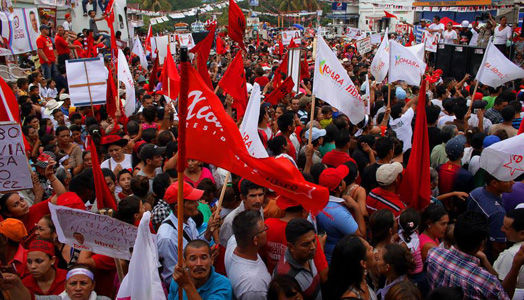
Honduras chooses a president on November 24. Xiomara Castro, candidate of the new Liberty and Refoundation Party (Libre) is running against the National Party’s Juan Orlando Hernández and Mauricio Villeda of the Liberal Party. Hondurans will also elect 128 members of parliament and 298 mayors. Three U.S. congresspersons have some election advice for Secretary of State John Kerry.
Representatives Raúl M. Grijalva (D-Arizona), Hank Johnson, D-Georgia) and Mike Honda (D-California) wrote him recently urging that the U.S. government “ensure free and fair elections” and “be entirely neutral in its public and private messages to this country.” They seek State Department condemnation of “attacks targeting human rights defenders and the opposition.”
Noting past U.S. support for “specific candidates in Latin American elections,” they point out that, “In November 2009, while the military coup in Honduras was still in force and basic civil liberties violently repressed, the State Department announced it would recognize the outcome of the presidential election even before the ballots had been counted.”
The election that year giving the presidency to National Party candidate Porfirio Lobo was marked by abstentions, arbitrary arrests, repression of independent media, violence, and early withdrawal of candidates. It followed the military coup that removed President Mel Zelaya (Xiomara Castro’s husband) from office on June 29, 2009. The military plane carrying Zelaya to exile in Costa Rica stopped en route at the U.S. Palmerola Air Base. Wikileaks revelations attest to State Department consultation with coup perpetrators beforehand.
The representatives claim the State Department “has largely countenanced the concentration of institutional power in the Honduran government in the past year …through illegal means.” They worry that “the freedom and fairness of this election is very much at risk, because “the ruling party now dominates all the key institutions of the government.”
Critiquing “militarization of the police,” they state that “at least sixteen activists and candidates from LIBRE have been assassinated since June of 2012.” “The candidate of the incumbent National Party,” they observe, has “based much of his campaign on a new hybrid military police, 5,000-strong.”
The outcome is unclear. Polling carried out between September 28 and October 5 by Technimerck shows Libre Party candidate Xiomara Castro preferred by 31.2 percent of voters (unchanged since August); Juan Orlando Hernández of the National Party, by 21 percent (a six point jump); and the Liberal Party candidate, by 14.8 percent. Party preference is divided between the National Party at 28.5 percent and the Libre Party at 28.2 percent. Gallup polling between September 6 and 12 found Xiomara Castro favored by 29 percent of voters and Juan Orlando Hernández by 27 percent, up nine percent since May. Several small parties are fielding candidates.
The Libre Party is an outgrowth of the National Front for Popular Resistance, formed immediately after the coup. Libre’s presidential campaign breaks an electioneering monopoly the two traditional parties enjoyed for a century. Its goal, according to founding documents, is to establish a “participatory and pro-socialist” form of government. Xiomara Castro has promised to revive President Zelaya’s Solidarity Network that “benefited more than 200 thousand families in extreme poverty … with undivided attention to [their] health care and education.” Such programs will serve “all families that need them, without political distinction.” Castro supports “infrastructure and projects serving [agricultural] production,” “We want a constituent national assembly, she announced, “to give power to the people.” Zelaya’s advocacy for a constituent assembly was one cue for the right-wing coup that removed him.
Failure of governance is a theme Castro returns to. Honduras’ murder rate is the world’s highest. Skyrocketing debt has led to economic crisis. The police are widely seen as corrupt and infiltrated by organized crime elements. The Libre Party calls for “community police” made up of “citizen professionals.” Xiomara Castro is optimistic: “We beat them in the streets,” she said, referring to uprisings after the coup, and “now we will do it at the ballot box.“
Priorities in Washington are otherwise. U.S. administrations tend to favor Latin American outcomes that maximize U.S. corporate access to natural resources. The Porfirio Lobo government is a willing partner in this. U.S. military spending in Honduras increased in 2011 by 71 percent over the previous year. There are new U.S. military bases ostensibly directed at drug trafficking. Honduras has become a communications hub for U.S. military, police, and drug enforcement activities in Central America.
The recent letter follows one from 87 House Democrats in May, 2011 to Secretary of State Clinton, another in March, 2013 from 94 representatives to Kerry; and one more from 21 senators on June 17, all three asking that security assistance be suspended.
For the executive branch to disregard congressional advice on the elections, as apparently happened with communications on a different subject earlier, is to ask for trouble. The appearance would be that of the U.S. government interfering with an election capable of delivering political power to a party aspiring to take on social disaster. U.S. leaders would look like they accept the suffering going along with Honduras’ 67 percent poverty rate in 2012. They would apparently be tolerating the murders of at least 60 agrarian rights activists in Aguan and, since the coup, of two dozen journalists and 70 members of the LGBT community.
Whether appearances in such matters concern them is questionable, however.
Photo: Xiomara Castro De Zelaya’s Facebook page.












Comments